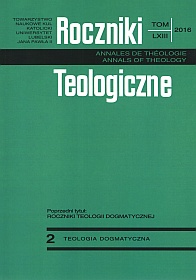The Voice Beyond Us. J. Ratzinger/Benedict XVI Theses about Conscience
Abstract
Many times culture and liberal and democratic mentality of post-modern Europe juxtapose individual conscience with objective and commonly valid moral law, treating the former as completely autonomous, while replacing the latter with the law established by majority. J. Ratzinger/Benedict XVI reminds that conscience is a subjective norm, but the one that is not deprived of objective reference. As the ability inherent in human nature by God's intention, it corresponds with the order of things, also established by God, and links a will (freedom) of man with the will (freedom) of God. Rationality, characteristic of a man, and expressing through conscience as the ability to get to know the truth of existence and distinguish good from evil, has its roots in obedience, that is the readiness to listen to. Thus, conscience is, in essence, an ability to listen to God and co-knowledge about Him. That is why, prayer and respect for teaching of the Church play crucial role in shaping conscience and neither cognition mistake nor personal ignorance either do not justify or finally release the man's guilt. It is crucified and resurrected Christ who justifies, and requirements of conscience lead to Christ, through remorse.
References
Nichols A., Myśl Benedykta XVI. Wprowadzenie do myśli teologicznej Josepha Ratzingera, tł. D. Chabrajska, Kraków 2006.
Müller G.L., Ubóstwo, tł. S. Śledziewski, Lublin 2014.
Ratzinger J., Czas przemian w Europie. Miejsce Kościoła i świata, tł. M. Mijalska, Kraków 2001.
Ratzinger J., Europa Benedykta w kryzysie kultur, tł. W. Dzieża, Częstochowa 2005.
Ratzinger J., Formalne zasady chrześcijaństwa. Szkice do teologii fundamentalnej, tł. W. Szymona, Poznań 2009.
Ratzinger J., Głosiciele Słowa i słudzy Waszej radości. Teologia i duchowość sakramentu święceń (Opera Omnia, t. 12), red. K. Góźdź, M. Górecka, tł. M. Górecka, M. Rodkiewicz (współpraca J. Kobienia, D. Petruk), Lublin 2012.
Ratzinger J., Kirche – Zeichen unter den Völkern. Schriften zur Ekklesiologie und Ökumene (Gesammelte Schriften, t. 8/1), Freiburg–Basel–Wien 2010.
Ratzinger J., Kościół – Ekumenizm – Polityka, red. i tł. L. Balter i in., Poznań–Warszawa 1990.
Ratzinger J., Kościół – znak wśród narodów. Pisma eklezjologiczne i ekumeniczne (Opera Omnia, t. 8/1, red. pol. K. Góźdź, M. Górecka, tł. W. Szymona, Lublin 2013.
Ratzinger J., Kościół – znak wśród narodów. Pisma eklezjologiczne i ekumeniczne (Opera Omnia, t. 8/2), red. pol. K. Góźdź, M. Górecka, tł. W. Szymona, Lublin 2013.
Ratzinger J., Künder des Wortes und Deiner eurer Freude (Gesammelte Schriften, t. 12), Freiburg–Basel–Wien 2010.
Ratzinger J., O nihilizmie, piekle i kryzysie w Kościele. [rozm. P. Lisicki, G. Górny, R. Smoczyński], „Fronda” 1999, nr 15-16, s. 6-21.
Ratzinger J., Podstawy moralności chrześcijańskiej [współautorzy: H. Schürmann, H.U. von Balthasar], tł. E. Adamiak, Poznań 1999.
Ratzinger J., Prawda, wartości, władza. Kiedy społeczeństwo można uznać za pluralistyczne, tł. G. Sowinski, Kraków 1999.
Ratzinger J., Wykłady bawarskie z lat 1963-2004, tł. A. Czarnocki, Warszawa 2009.
Ratzinger J./Benedykt XVI, Jezus z Nazaretu. Część 1: Od chrztu w Jordanie do Przemienienia, tł. W. Szymona, Kraków 2007.
Ratzinger J./Benedykt XVI, Kościół. Wspólnota w drodze, tł. D. Chodyniecki, Kielce 2009.
Rowland T., Wiara Ratzingera. Teologia Benedykta XVI, tł. A. Gomola, Kraków 2010.
Szymik J., Theologia benedicta, t. 2, Katowice 2012.
Tornielli A., Ratzinger. Strażnik wiary, tł. B. Tomaszek, Kraków 2005.
Valli A.M., Ratzinger na celowniku. Dlaczego go atakują? Dlaczego jest słuchany?, tł. M. Masny, Kraków 2011.
Copyright (c) 2016 Roczniki Teologiczne

This work is licensed under a Creative Commons Attribution-NonCommercial-NoDerivatives 4.0 International License.





